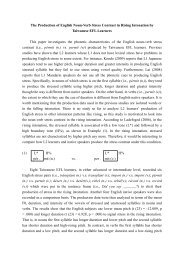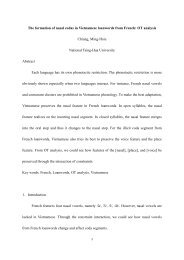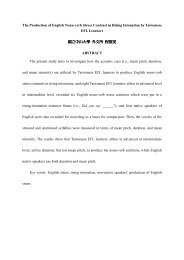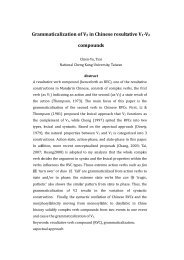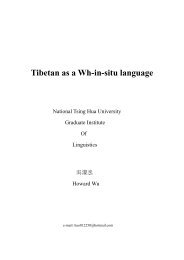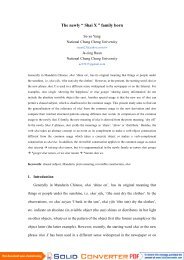1. “Gentle Communion” by Pat Mora Even the long-dead are willing ...
1. “Gentle Communion” by Pat Mora Even the long-dead are willing ...
1. “Gentle Communion” by Pat Mora Even the long-dead are willing ...
Create successful ePaper yourself
Turn your PDF publications into a flip-book with our unique Google optimized e-Paper software.
<strong>1.</strong> <strong>“Gentle</strong> <strong>Communion”</strong> <strong>by</strong> <strong>Pat</strong> <strong>Mora</strong><br />
<strong>Even</strong> <strong>the</strong> <strong>long</strong>-<strong>dead</strong> <strong>are</strong> <strong>willing</strong> to move.<br />
Without a word, she came with me from <strong>the</strong> desert.<br />
Mornings she wanders through my rooms<br />
making beds, folding socks.<br />
Since she can’t hear me anymore,<br />
Mamande ignores <strong>the</strong> questions I never knew<br />
to ask, about her younger days, her red<br />
hair, <strong>the</strong> time she fell and broke her nose<br />
in <strong>the</strong> snow. I will never know.<br />
When I try to make her laugh,<br />
to disprove her sad album face, she leaves<br />
<strong>the</strong> room, resists me as she resisted<br />
grinning for cameras, make-up, English.<br />
While I write, she sits and prays,<br />
feet apart, legs never crossed,<br />
<strong>the</strong> blue housecoat buttoned high<br />
as her hair dries white, girlish<br />
around her head and shoulders.<br />
She closes her eyes, bows her head,<br />
and like a child presses her hands toge<strong>the</strong>r,<br />
her patient flesh steeple, <strong>the</strong> skin<br />
worn, like <strong>the</strong> pages of her prayer book.<br />
Sometimes I sit in her wide-armed<br />
chair as I once sat in her lap.<br />
Alone, we played a quiet I Spy.<br />
She peeled grapes I still taste.
She removes <strong>the</strong> thin skin, places<br />
<strong>the</strong> luminous coolness on my tongue.<br />
I know not to bite or chew. I wait<br />
for <strong>the</strong> thick melt,<br />
our private green honey.<br />
2. “My Life had stood—a Loaded Gun” <strong>by</strong> Emily Dickinson<br />
My Life had stood—a Loaded Gun—<br />
In Corners—till a Day<br />
The Owner passed—identified—<br />
And carried Me away—<br />
And now We roam in Sovereign Woods—<br />
And now We hunt <strong>the</strong> Doe—<br />
And every time I speak for Him—<br />
The Mountains straight reply—<br />
And do I smile, such cordial light<br />
Upon <strong>the</strong> Valley glow—<br />
It is as a Vesuvian face<br />
Had let its pleasure through—<br />
And when at Night—Our good Day done—<br />
I guard My Master’s Head—<br />
’Tis better than <strong>the</strong> Eider-Duck’s<br />
Deep Pillow—to have sh<strong>are</strong>d—<br />
To foe of His—I’m <strong>dead</strong>ly foe—<br />
None stir <strong>the</strong> second time—
On whom I lay a Yellow Eye—<br />
Or an emphatic Thumb—<br />
Though I than He—may <strong>long</strong>er live<br />
He <strong>long</strong>er must—than I—<br />
For I have but <strong>the</strong> power to kill,<br />
Without—<strong>the</strong> power to die—<br />
3. “One Art” <strong>by</strong> Elizabeth Bishop<br />
The art of losing isn’t hard to master;<br />
so many things seem filled with <strong>the</strong> intent<br />
to be lost that <strong>the</strong>ir loss is no disaster.<br />
Lose something every day. Accept <strong>the</strong> fluster<br />
of lost door keys, <strong>the</strong> hour badly spent.<br />
The art of losing isn’t hard to master.<br />
Then practice losing far<strong>the</strong>r, losing faster:<br />
places, and names, and where it was you meant<br />
to travel. None of <strong>the</strong>se will bring disaster.<br />
I lost my mo<strong>the</strong>r’s watch. And look! my last, or<br />
next-to-last, of three loved houses went.<br />
The art of losing isn't hard to master.<br />
I lost two cities, lovely ones. And, vaster,<br />
some realms I owned, two rivers, a continent.<br />
I miss <strong>the</strong>m, but it wasn’t a disaster.<br />
—<strong>Even</strong> losing you (<strong>the</strong> joking voice, a gesture
I love) I shan't have lied. It's evident<br />
<strong>the</strong> art of losing’s not too hard to master<br />
though it may look like (Write it!) like disaster.<br />
4. “When We Two Parted” <strong>by</strong> Lord George Gordon Byron<br />
When we two parted<br />
In silence and tears,<br />
Half broken-hearted<br />
To sever for years,<br />
Pale grew thy cheek and cold,<br />
Colder thy kiss;<br />
Truly that hour foretold<br />
Sorrow to this.<br />
The dew of <strong>the</strong> morning<br />
Sunk chill on my brow—<br />
It felt like <strong>the</strong> warning<br />
Of what I feel now.<br />
Thy vows <strong>are</strong> all broken,<br />
And light is thy fame;<br />
I hear thy name spoken,<br />
And sh<strong>are</strong> in its shame.<br />
They name <strong>the</strong>e before me,<br />
A knell to mine ear;<br />
A shudder comes o'er me—<br />
Why wert thou so dear<br />
They know not I knew <strong>the</strong>e,<br />
Who knew <strong>the</strong>e too well—<br />
Long, <strong>long</strong> I shall rue <strong>the</strong>e,
Too deeply to tell.<br />
In secret we met—<br />
In silence I grieve,<br />
That thy heart could forget,<br />
Thy spirit deceive.<br />
If I should meet <strong>the</strong>e<br />
After <strong>long</strong> years,<br />
How should I greet <strong>the</strong>e<br />
With silence and tears.<br />
5. “Theme for English B” <strong>by</strong> Langston Hughes<br />
The instructor said,<br />
Go home and write<br />
a page tonight.<br />
And let that page come out of you—<br />
Then, it will be true.<br />
I wonder if it’s that simple<br />
I am twenty-two, colored, born in Winston-Salem.<br />
I went to school <strong>the</strong>re, <strong>the</strong>n Durham, <strong>the</strong>n here<br />
to this college on <strong>the</strong> hill above Harlem.<br />
I am <strong>the</strong> only colored student in my class.<br />
The steps from <strong>the</strong> hill lead down into Harlem,<br />
through a park, <strong>the</strong>n I cross St. Nicholas,<br />
Eighth Avenue, Seventh, and I come to <strong>the</strong> Y,<br />
<strong>the</strong> Harlem Branch Y, where I take <strong>the</strong> elevator<br />
up to my room, sit down, and write this page:
It’s not easy to know what is true for you or me<br />
at twenty-two, my age. But I guess I’m what<br />
I feel and see and hear, Harlem, I hear you:<br />
hear you, hear me—we two—you, me, talk on this page.<br />
(I hear New York, too.) Me—who<br />
Well, I like to eat, sleep, drink, and be in love.<br />
I like to work, read, learn, and understand life.<br />
I like a pipe for a Christmas present,<br />
or records—Bessie, bop, or Bach.<br />
I guess being colored doesn’t make me not like<br />
<strong>the</strong> same things o<strong>the</strong>r folks like who <strong>are</strong> o<strong>the</strong>r races.<br />
So will my page be colored that I write<br />
Being me, it will not be white.<br />
But it will be<br />
a part of you, instructor.<br />
You <strong>are</strong> white—<br />
yet a part of me, as I am a part of you.<br />
That’s American.<br />
Sometimes perhaps you don’t want to be a part of me.<br />
Nor do I often want to be a part of you.<br />
But we <strong>are</strong>, that’s true!<br />
As I learn from you,<br />
I guess you learn from me—<br />
although you’re older—and white—<br />
and somewhat more free.<br />
This is my page for English B.<br />
6. “Strange Fits of Passion Have I Known” <strong>by</strong> William Wordsworth
Strange fits of passion have I known:<br />
And I will d<strong>are</strong> to tell,<br />
But in <strong>the</strong> lover's ear alone,<br />
What once to me befell.<br />
When she I loved looked every day<br />
Fresh as a rose in June,<br />
I to her cottage bent my way,<br />
Beneath an evening-moon.<br />
Upon <strong>the</strong> moon I fixed my eye,<br />
All over <strong>the</strong> wide lea;<br />
With quickening pace my horse drew nigh<br />
Those paths so dear to me.<br />
And now we reached <strong>the</strong> orchard-plot;<br />
And, as we climbed <strong>the</strong> hill,<br />
The sinking moon to Lucy’s cot<br />
Came near, and ne<strong>are</strong>r still.<br />
In one of those sweet dreams I slept,<br />
Kind Nature’s gentlest boon!<br />
And all <strong>the</strong> while my eye I kept<br />
On <strong>the</strong> descending moon.<br />
My horse moved on; hoof after hoof<br />
He raised, and never stopped:<br />
When down behind <strong>the</strong> cottage roof,<br />
At once, <strong>the</strong> bright moon dropped.<br />
What fond and wayward thoughts will slide<br />
Into a Lover’s head!
“O mercy!” to myself I cried,<br />
“If Lucy should be <strong>dead</strong>!”<br />
7. “Ethics” <strong>by</strong> Linda Pastan<br />
In ethics class so many years ago<br />
our teacher asked this question every fall:<br />
if <strong>the</strong>re were a fire in a museum<br />
which would you save, a Rembrandt painting<br />
or an old woman who hadn’t many<br />
years left anyhow Restless on hard chairs<br />
caring little for pictures or old age<br />
we’d opt one year for life, <strong>the</strong> next for art<br />
and always half-heartedly. Sometimes<br />
<strong>the</strong> woman borrowed my grandmo<strong>the</strong>r’s face<br />
leaving her usual kitchen to wander<br />
some drafty, half-imagined museum.<br />
One year, feeling clever, I replied<br />
why not let <strong>the</strong> woman decide herself<br />
Linda, <strong>the</strong> teacher would report, eschews<br />
<strong>the</strong> burdens of responsibility.<br />
This fall in a real museum I stand<br />
before a real Rembrandt, old woman,<br />
or nearly so, myself. The colors<br />
within this frame <strong>are</strong> darker than autumn,<br />
darker even than winter—<strong>the</strong> browns of earth,<br />
though earth’s most radiant elements burn<br />
through <strong>the</strong> canvas. I know now that woman<br />
and painting and season <strong>are</strong> almost one<br />
and all beyond saving <strong>by</strong> children.
8. “Musée des Beaux Arts” <strong>by</strong> W. H. Auden<br />
About suffering <strong>the</strong>y were never wrong,<br />
The Old Masters: how well, <strong>the</strong>y understood<br />
Its human position; how it takes place<br />
While someone else is eating or opening a window or just walking dully a<strong>long</strong>;<br />
How, when <strong>the</strong> aged <strong>are</strong> reverently, passionately waiting<br />
For <strong>the</strong> miraculous birth, <strong>the</strong>re always must be<br />
Children who did not specially want it to happen, skating<br />
On a pond at <strong>the</strong> edge of <strong>the</strong> wood:<br />
They never forgot<br />
That even <strong>the</strong> dreadful martyrdom must run its course<br />
Anyhow in a corner, some untidy spot<br />
Where <strong>the</strong> dogs go on with <strong>the</strong>ir doggy life and <strong>the</strong> torturer’s horse<br />
Scratches its innocent behind on a tree.<br />
In Breughel’s Icarus, for instance: how everything turns away<br />
Quite leisurely from <strong>the</strong> disaster; <strong>the</strong> ploughman may<br />
Have heard <strong>the</strong> splash, <strong>the</strong> forsaken cry,<br />
But for him it was not an important failure; <strong>the</strong> sun shone<br />
As it had to on <strong>the</strong> white legs disappearing into <strong>the</strong> green<br />
Water; and <strong>the</strong> expensive delicate ship that must have seen<br />
Something amazing, a boy falling out of <strong>the</strong> sky,<br />
Had somewhere to get to and sailed calmly on.



